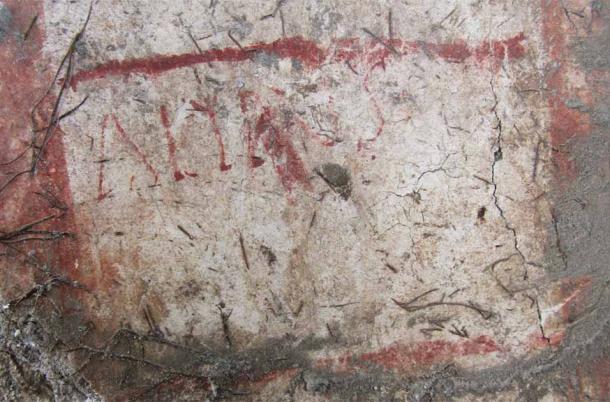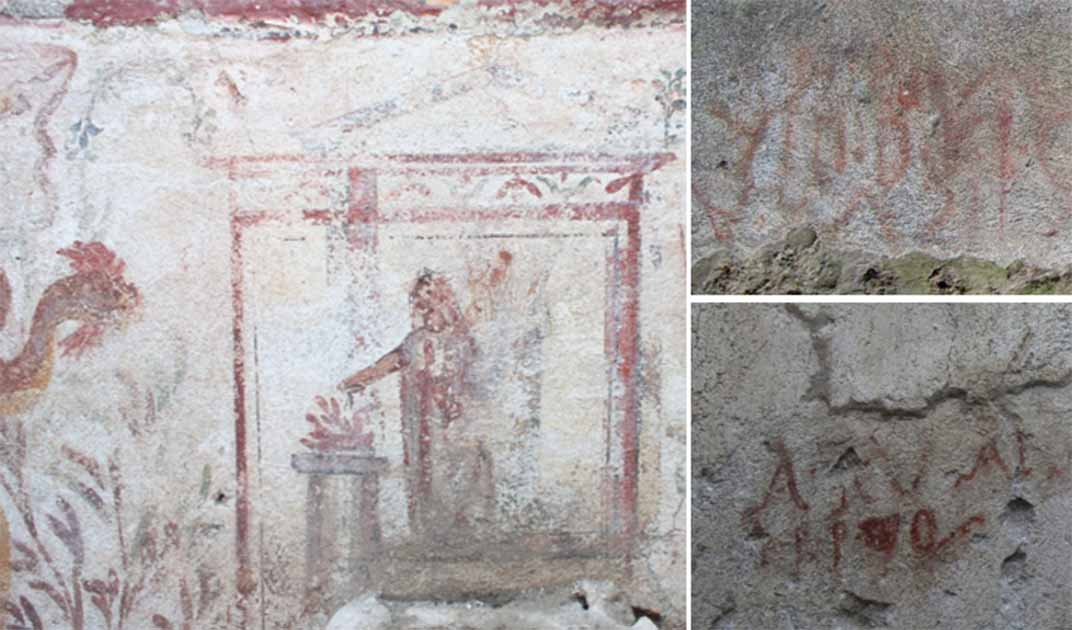Electoral Inscriptions Found in Pompeii Suggest Indoor Political Campaigning
Mount Vesuvius truly keeps on giving, historically speaking. A fresh round of excavations have revealed political graffiti and a fascinating array of election inscriptions along the Via de Nola, one of Pompeii’s longest streets. Dating back almost 2,000 years, these inscriptions, akin to today's political posters and campaign brochures, adorn the walls of the room that once housed the lararium, the household's sacred altar.
The inscriptions on the walls seem to make reference to a candidate named Aulus Rustius Verus, who was actively campaigning for political office. According to experts, it is conceivable that Verus may have employed a strategy involving the provision of bread as an incentive to secure votes.
In a grim twist of fate, Verus and his loyal supporters might have fallen victim to the catastrophic eruption of Mount Vesuvius in the year 79 AD, according to a press statement by Pompeii Archaeological Park. They’ve described the inscriptions as 'the ancient equivalent of today's electoral posters and postcards'.
Votes for Favors: Age-Old Practice
It appears that the age-old practice of exchanging votes for favors was already in existence during that era, as detailed in the online scientific magazine of the Pompeii Archaeological Park, the e-Journal of the Pompeii Excavation. These excavations have also revealed the evidence of the final offering made at the domestic altar, likely performed just prior to the cataclysmic eruption.

The Pompeii inscriptions were found within the chamber that contained the lararium, the household's altar. (Pompeii Sites)
The location of these inscriptions within the interior of the house is a source of wonder: convention dictated that such inscriptions be prominently displayed on the exterior facades of buildings. This allowed citizens to see the names and qualifications of candidates vying for various city magistracies, underscoring the extent to which political campaigning and patronage were interwoven into the daily life of Pompeii's residents, even within the confines of their homes.
- Curiosity Killed Pliny the Elder during the Eruption of Mount Vesuvius
- Lavish Home of Two Former Slaves Opened Up to the Public in Pompeii
Archaeologists provide a compelling enough explanation for the appearance of electoral propaganda within the house: the prevalent custom of hosting gatherings and dinners within the residences of the candidates and their associates, as a strategic means of promoting their electoral campaigns, reports Arkeo News. This practice allowed for a more intimate and persuasive engagement with potential voters, not dissimilar to electoral practices and fundraisers for modern politicians.

The house possibly belonged to a supporter of the candidate Aulus Rustius Verus, where gatherings and dinners were hosted with the goal of advancing the electoral campaign. (Pompeii Sites)
In this particular instance, these signs vigorously advocate for the election of the aforementioned Aulus Rustius Verus to the esteemed position of aedile, a councilor responsible for overseeing public works in ancient Rome. This prominent figure appears in other inscriptions and is well-known in Pompeii for having held the city's highest public office, that of duoviri, a position one ascended to after serving as an aedile, during the 70s of the first century AD.
In the Roman context, duoviri were magistrates elected in pairs, affording them the opportunity to collaborate and provide mutual counsel as they supervised the city's public, political, and administrative affairs. Aulus Rustius Verus shared this distinguished position with Giulio Polybius, who resided in a magnificent house on the Avenue of Plenty. Consequently, the recently uncovered inscriptions predate this appointment and likely played a role in Aulus Rustius Verus's successful election campaign.
Presence of a Bakery: Bread for Votes!
In all likelihood, this house was of a fervent supporter of Aulus Rustius, possibly one of his freedmen or a close friend, reports El Pais. The house also contains something unusual: a bakery equipped with a substantial oven, adjacent to which the remains of three unfortunate victims - two women and a child - were discovered. They probably died as a result of the attic's collapse during the initial phase of the volcanic eruption, their remains unearthed only a few months ago.
The bakery's presence, in simple terms, suggests a very straightforward bread-for-votes political practice, explains Maria Chiara Scappaticcio, a professor of Latin at the Federico II University in Naples, Italy, and co-author of the study. She elucidates that councilors and bakers were known to collaborate, often pushing the boundaries of legality. She suggests that Aulus Rustius Verus may have astutely recognized, even during his campaign for councillorship, that the key to a voter's heart was through their stomach, as "above all, the voter lives on bread."

Electoral nscriptions with the candidate's initials, ARV, appear on a volcanic rock millstone, placed in the entrance of the house. (Pompeii Sites)
Supporting this notion, the initials "A.R.V." were uncovered on a volcanic millstone situated near the house's entrance hall, where renovations were underway at the time of the eruption. This discovery hints at the possibility that Aulus Rustius Verus may have directly financed the bakery's operations, driven by both economic and political motivations, noted Scappaticcio.
Finally, the remains of a votive offering were discovered on the altar of the grand lararium, adorned with two stucco snakes, likely presented shortly before the catastrophic eruption. Upon analysis, researchers determined that this ritual involved the burning of figs and dates in front of the altar, culminating with the placement of an intact egg directly upon the lararium's stonework altar, after which it was concealed with a tile.
- The Age of Confusion: Mass Manipulation & Propaganda - Part One
- The Age of Confusion: Mass Manipulation & Propaganda - Part Two

Burnt remnants found atop the Lararium's altar. (Pompeii Sites)
The director of the Pompeii Archaeological Park, Gabriel Zuchtriegel concluded by saying:
“To my knowledge, we are the world’s first archaeological site to practice this form of scientific transparency: we are convinced that, in this way, Pompeii will be an international model for a new type of data accessibility because of the opportunities that digital technologies offer. The future of archaeology is here.”
Top image: Electoral inscriptions have been found in an ancient house at Pompeii, which was destroyed by the eruption of Mount Vesuvius in AD 79. Source: Pompeii Sites
By Sahir Pandey
References
Altuntas, L. 2023. Electoral inscriptions just discovered in Pompeii reveal clientelism in ancient Rome. Available at: https://arkeonews.net/electoral-inscriptions-discovered-in-pompeii-reveal-clientelism-in-ancient-rome/.
Chadwick, J. 2023. Pompeii's Parliament! Archaeologists discover electoral inscriptions in an ancient house caught in Mount Vesuvius' devastating eruption. Available at: https://www.dailymail.co.uk/sciencetech/article-12584519/Pompeiis-Parliament-Archaeologists-discover-electoral-inscriptions-ancient-house-caught-Mount-Vesuvius-devastating-eruption.html.
Milligan, M. 2023. ELECTORAL INSCRIPTIONS FOUND IN POMPEII HOUSE. Available at: https://www.heritagedaily.com/2023/09/electoral-inscriptions-found-in-pompeii-house/148739.
Pacho, L. 2023. Electoral inscriptions discovered in Pompeii reveal political patronage and corruption in ancient Rome. Available at: https://english.elpais.com/culture/2023-09-29/electoral-inscriptions-discovered-in-pompeii-reveal-clientelism-and-political-corruption-in-ancient-rome.html.

















